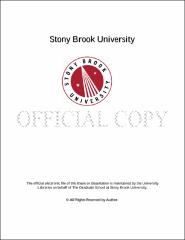| dc.identifier.uri | http://hdl.handle.net/11401/76588 | |
| dc.description.sponsorship | This work is sponsored by the Stony Brook University Graduate School in compliance with the requirements for completion of degree. | en_US |
| dc.format | Monograph | |
| dc.format.medium | Electronic Resource | en_US |
| dc.language.iso | en_US | |
| dc.publisher | The Graduate School, Stony Brook University: Stony Brook, NY. | |
| dc.type | Dissertation | |
| dcterms.abstract | This thesis explores the consequences of mutated neurofibromin gene, NF1, on memory. NF1 disorder is an inheritable genetic disease in humans that is produced by mutation of the gene that encodes the large protein neurofibromin. Mutations in this gene produce fairly non-specific and widespread cognitive defects in human patients, in addition to a variety of other pathologies, such as benign tumors of the peripheral nervous system. It is unknown how NF1 disorder leads to cognitive deficits. Uncovering the mechanism is hampered by the fact that mutations in the NF1 gene have very unpredictable effects. Even identical (monozygotic) twins who have the same mutation sites can manifest wildly different symptoms. It is unclear why this is the case, but it certainly shows that mutated neurofibromin causes different pathologies in different tissues. Whilst NF1 is widely expressed throughout the body, it is not known if cognitive defects arise from its action in a particular region of the brain or throughout the whole brain. Here I explore this issue using the powerful genetic and behavioral techniques in the model organism, Drosophila melanogaster. I show that normal NF1 protein is required in octopamine neurons. Lacking of correct NF1 gene expression in these neurons leads to impaired long term memory, but not impaired learning. Manipulating the excitability of octopamine neurons after consolidation modulated appetitive LTM. NF1-dependent memory does not require the mushroom body, the insect learning and memory center. This the first time a specific neuron type has been identified as playing a role in the cognitive deficits in Drosophila NF1 research. | |
| dcterms.available | 2017-09-20T16:50:42Z | |
| dcterms.contributor | Kernan, Maurice | en_US |
| dcterms.contributor | Zhong, Yi | en_US |
| dcterms.contributor | Dubnau, Joshua | en_US |
| dcterms.contributor | Turner, Glenn | en_US |
| dcterms.contributor | Gan, Wenbiao. | en_US |
| dcterms.creator | Xu, Chunsu | |
| dcterms.dateAccepted | 2017-09-20T16:50:42Z | |
| dcterms.dateSubmitted | 2017-09-20T16:50:42Z | |
| dcterms.description | Department of Neuroscience. | en_US |
| dcterms.extent | 91 pg. | en_US |
| dcterms.format | Monograph | |
| dcterms.format | Application/PDF | en_US |
| dcterms.identifier | http://hdl.handle.net/11401/76588 | |
| dcterms.issued | 2015-08-01 | |
| dcterms.language | en_US | |
| dcterms.provenance | Made available in DSpace on 2017-09-20T16:50:42Z (GMT). No. of bitstreams: 1
Xu_grad.sunysb_0771E_12203.pdf: 2682124 bytes, checksum: dbd6afb2f9a2ff7997e658729927b79d (MD5)
Previous issue date: 2014 | en |
| dcterms.publisher | The Graduate School, Stony Brook University: Stony Brook, NY. | |
| dcterms.subject | Neurosciences | |
| dcterms.subject | drosophila behaivor, learning and memory, long term memory, neurofibromatosis type 1, octopamine | |
| dcterms.title | The role of NF1 in Drosophila appetitive long term memory | |
| dcterms.type | Dissertation | |

